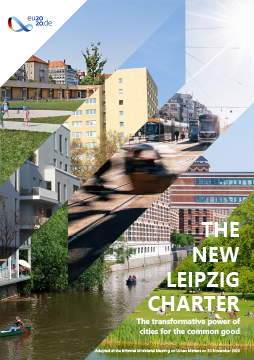New Leipzig Charter- The transformative power of cities for the common good

Europe has a wide variety of small, medium-sized and large cities. As part of a polycentric urban system, these are functional areas with varying potentials and challenges. European cities are more than places of densely arranged built structures, they also enable cultural, social, ecologic and economic interaction. Most cities are unique, historically grown centres of outstanding cultural value shaping Europe’s urban heritage and the identity of its citizens. Thus, culture is at the core of any sustainable urban development, including the preservation and development of the built and other cultural heritage.
Cities are places of pluralism, creativity and solidarity. Cultural and political traditions have been foundations for the development of cities reflecting democratic rights and values. Cities are also laboratories for new forms of problem-solving and test beds for social innovation.
High-quality, open and safe public spaces function as vibrant urban places, allowing people to interact, exchange and integrate into society. Good urban planning and design should be reinforced to enable compact, socially and economically mixed cities with well-developed infrastructure and a healthy environment and opportunities for identification contributing to the well-being of all. This requires a holistic understanding of high-quality Baukultur as the basis of integrated planning and design processes for every man-made shaping of the built environment in European cities. It also encompasses the management and conversion of existing buildings as well as the design and construction of contemporary buildings, infrastructure and public spaces.
Cities and urban systems need flexibility as well as the ability to respond to external disruptive events and chronic stress. The robustness of cities to cope with changing framework conditions should be supported by an ability to learn from past events and from each other, flexible urban governance for the common good as well as balanced implementation of just, green and productive cities. Predictive and preventive policies, plans and projects should include diverse scenarios to anticipate environmental and climatic challenges and economic risks as well as social transformation and health concerns.
